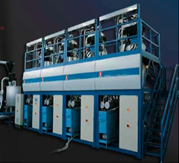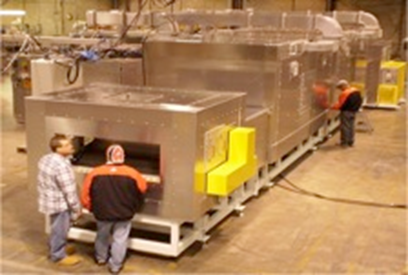The Challenge

The plastic industry is one of the world’s largest consumers of oil; over five million barrels a day are used in the creation of hundreds of different polymers for consumers and industry. Cheap, light weight and extremely versatile, plastics have found their way into almost every product imaginable. These products, often designed for single use, will usually be disposed of to landfill along with other domestic and commercial wastes. Despite increased recycling efforts, we still incinerate more plastic than we recycle and even then 80% of the world’s plastic still ends up going to landfill.

Most countries, states and cities are trying to find sustainable long-term solutions to their waste management problems. Although some of the easier to recycle and in demand polymers such as polyethylene and PET are baled and usually sent to the Far East for cheap processing, many other plastics such as silage wrap, multi layer films or laminates, contaminated plastics, industrial waste and the residual plastic waste from previous recycling operations are destined for landfill. There is currently no alternative sustainable use for these mixed waste plastics and considering the amount of oil contained within them, there exists a significant opportunity on a global scale to recover this value.
The Solution
RCR International designs and develops facilities that convert waste plastics into high-grade oils. The RCR Energy fuel systems uses a continuous liquefaction technology that indirectly heats the plastic waste and a unique catalytic reaction to generate hydrocarbon gases which are then cooled and condensed to produce ASTM spec diesel as well as a proprietary blend of heating fuel.

These oils not only exceed regulatory standards, but can be used in any diesel engines, trucks, buses, trains, boats, heavy equipment and generators with no engine modification.
An RCR fuel plant can produce approximately 950 liters of high-grade diesel fuel from each ton of waste plastic.
Different polymers can be processed together without any sorting and typical contaminants such as grit, paper, metal, food residue and oils do not need to be removed before treatment. The advanced system has the capability to take high loads of PVC and PET along with the ideal polyolefin plastics without damaging the reactor or producing unacceptably high emissions.

The RCR technology, originating from Japan, but perfected and further developed in the USA has been in commercial operation for over twenty years and there are now dozens of reference facilities that have the capacity of producing fuels at a rate of over five hundred liters per hour.
RCR’s distillate fuel is not only greener than virgin fuels, due to its reduced carbon footprint, but it is also a superior product due to its cleaner burning properties and high cetane rating.
RCR’s new reactors are more proven, energy efficient and inherently safer than traditional process equipment, but have low operational costs and minimal maintenance. RCR plans to establish facilities across North America and Europe and is actively discussing opportunities with a number of organizations that currently dispose of large volumes of plastic suitable to the RCR Energy fuel process on an own and operate, joint venture and partnership basis.
The Outcome
- Tons of mixed plastics waste diverted from landfill
- Green diesel grade fuels and heating oil generated from waste
- Carbon dioxide offset
- Preservation of fossil fuels
- New jobs and taxes generated from the green economy
